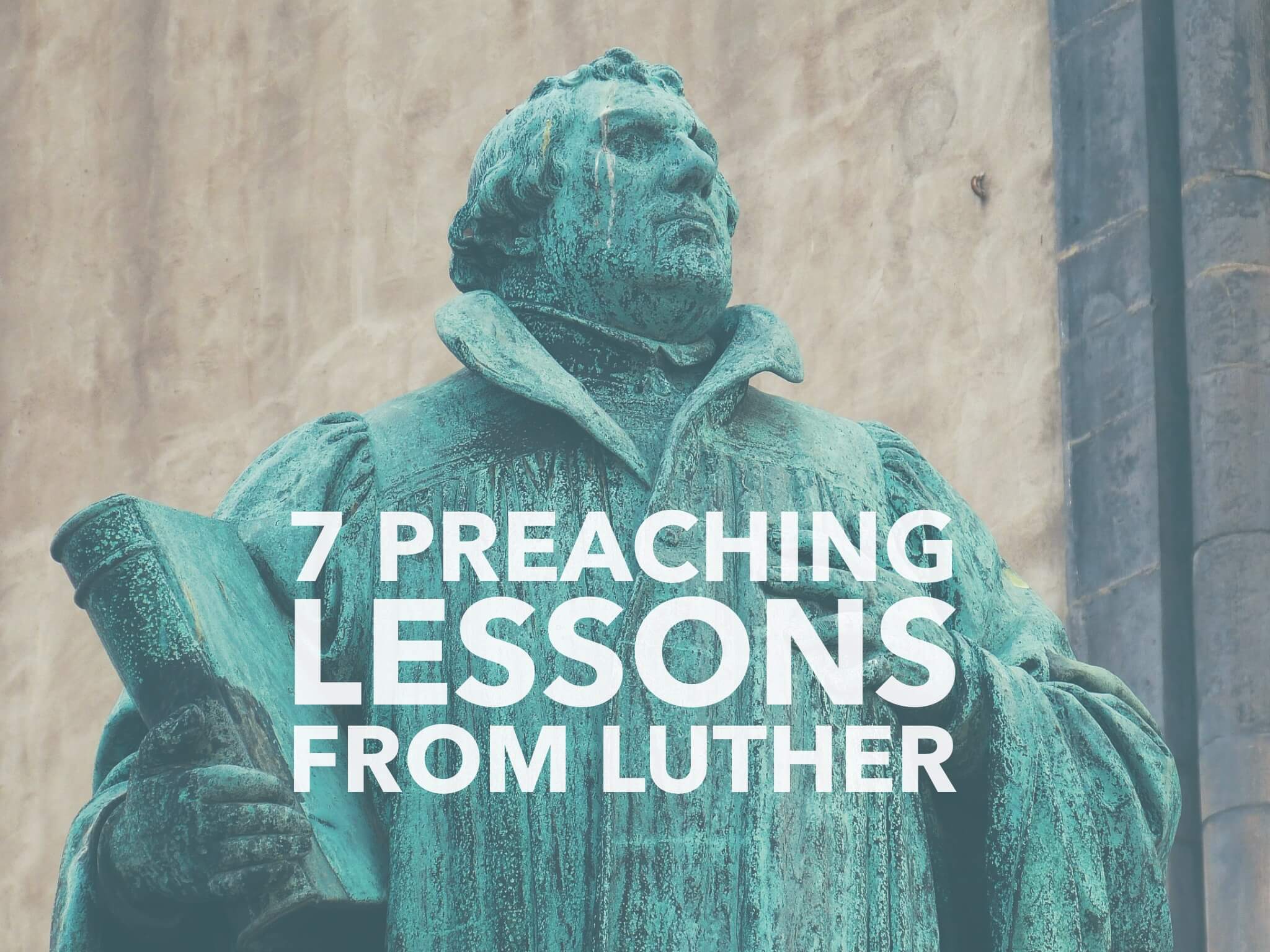7 Preaching Lessons from Martin Luther

Martin Luther was a preaching machine.
Luther preached around 4,000 sermons in his life (2,300 have been preserved). On average, he preached 120 sermons per year. That’s a sermon every three days.1
And we think preaching every seven days is hard!
Luther never used a manuscript. Although he studied well in preparation, he preached extemporaneously from a short outline. Since this was an unprecedented (and frightening) approach to preaching at the time, his students called it “the heroic method.”2
Luther’s preaching was a catalyst of the Reformation. In fact, the Reformation (largely because of Luther) broke from the Catholic mass where preaching was optional, and the preaching of God’s Word became the central element of the church gathering.
So, in honor of Reformation Day, here are seven preaching tips we can learn from Martin Luther.
1. Preach God’s Word
The power of Luther’s preaching was his unwavering focus on the text.
Luther said:
“I simply taught, preached, wrote God’s Word; otherwise I did nothing. And then, while I slept, or drank Wittenberg beer… the Word so greatly weakened the papacy that never a prince or emperor did such damage to it. I did nothing. The Word did it all.”3
”I take pains to treat a verse, to stick to it, and so to instruct the people that they can say, ‘That is what the sermon was about.'”4
“Therefore you must continually keep God’s Word in your heart, on your lips, and in your ears. For where the heart stands idle and the Word is not heard, the devil breaks in and does his damage before we realize it. On the other hand, when we seriously ponder the Word, hear it, and put it to use, such is its power that it never departs without fruit.” 5
The purpose of preaching is to communicate God’s Word. Our authority and power should rest on the foundation of Scripture.
2. Preach Simply
Luther spoke simply to simple people.
As educated and brilliant as he was, Luther knew that his mastery of biblical languages and theology was meaningless if his congregation did not understand what he said.
Luther said:
“Cursed be every preacher who aims at lofty topics in the church, looking for his own glory and selfishly desiring to please one individual or another. When I preach here I adapt myself to the circumstances of the common people. I don’t look at the doctors and masters, of whom scarcely forty are present, but at the hundred or the thousand young people and children. It’s to them that I preach, to them that I devote myself, for they too need to understand. If the others don’t want to listen, they can leave… we preach in public for the sake of plain people. Christ could have taught in a profound way, but He wished to deliver His message with the utmost simplicity in order that common people might understand. Good God, there are sixteen-year-old girls, women, and farmers in the church, and they don’t understand lofty matters.”6
Keep it simple. Communicate profound truth in understandable ways.
3. Preach the Gospel
Luther emphasized the Gospel of Jesus Christ. Every sermon was a path to the cross.
Luther said:
“The Gospel is not the preaching of Christ as example, but proclaiming Him as a gift. Whether a man stands or falls he is a Christian only if he has Christ. Looking for evidence elsewhere only brings uncertainty. Cling only to the word.”7
“Whoever wants to read the Bible must make sure he is not wrong, for the Scriptures can easily be stretched and guided, but no one would guide the according to his emotions; he should lead them to the well that is to the cross of Christ, then he will certainly be right and cannot fail.”8
As Luther said, ”Preach one thing: the wisdom of the cross.”9
4. Preaching is God’s Work
Preaching is not the work of people. It is the work of God.
Luther said:
“It is easy enough for someone to preach the word to me, but only God can put it into my heart. He must speak it in my heart, or nothing at all will come of it. If God remains silent, the final effect is as though nothing had been said.” 10
“In all simplicity seek only God’s glory and not the applause of men. And pray that God will put wisdom into your mouth and give your hearers a ready ear; then leave it to God. For you must believe me, preaching is not the work of men.”11
“So the pastor must be sure that God speaks through his mouth. Otherwise it is time for him to be quiet.”12
Preach for the approval of God, not people. What good is it if people like your preaching but God does not?
Luther warns, “God’s approval declines at the same rate that human approval increases.”13
5. Don’t Quit Preaching
Luther felt discouragement like the rest of us.
In 1528 he threatened to never preach again unless he saw more fruit in his people.
In 1530, he was so frustrated with the lack of response from his congregation that he took a hiatus from preaching from January to September, until returning refreshed and recommitted.
Luther said:
“For one should not quit simply because so few are changed for the better in hearing the preaching of the gospel. But do what Christ did: He rescued the elect and left the rest behind. This is what the apostles did also. It will not be better for you.”14
“If Peter and Paul were here, they would scold you because you wish right off to be as accomplished as they. Crawling is something, even if one is unable to walk. Do your best. If you cannot preach an hour, then preach half an hour or a quarter of an hour. Do not try to imitate other people. Center on the shortest and simplest points, which are the very heart of the matter, and leave the rest to God. Look solely to his honor and not to applause. Pray that God will give you a mouth and to your audience ears. I can tell you preaching is not a work of man. Although I am old and experienced, I am afraid every time I have to preach…. So pray to God and leave all the rest to him.”15
You may be able to relate to Luther when he said, “I would not want to preach another sermon to the end of my days.”16 But do not give up.
God is not finished with you yet. Keep preaching.
6. Fear of Preaching is Normal
Even the great Martin Luther was terrified of public speaking.
Luther said:
“Ah, my friend, I had the same experience. I feared the pulpit perhaps as greatly as you do; yet I had to do it; I was forced to preach. At first I had to preach to the brethren in the refectory. Ah, how I feared the pulpit!” 17
“O how frightened I was at the sight of the pulpit!”18
Fear is normal. But God is greater than our fears. If He has called you to preach, He will guide you through it.
So, if the thought of preaching terrifies you, you are in good company.
7. Preaching is Pivotal
Luther restored preaching to prominence in the church. He held it in the highest regard as an essential part of the worship service.
Luther said:
”The church is not a pen house, but a mouth house. For since the advent of Christ the gospel, which used to be hidden in the Scriptures, has become an oral preaching. And thus it is the manner of the New Testament and of the gospel that it must be preached and performed by word of mouth and a living voice. Christ himself has not written anything, nor has he ordered anything to be written, but rather to be preached by word of mouth.”19
When you preach, you carry on the tradition established by Christ.
Why is preaching so important? Luther pointed to Romans 10:17, “So faith comes from hearing, and hearing through the word of Christ” (ESV).
Sources:
- Derek W.H. Thomas, “Spare Everything But the Word: Luther As Preacher,” in The Legacy of Luther Kindle ed. (ed. R.C. Sproul and Stephen J. Nichols; Orlando, FL: Reformation Trust, 2016), Location 6148.
- Thomas, “Luther As Preacher,” Location 6161.
- Timothy George, Theology of the Reformers (Nashville, TN: B&H 2013), 54-55.
- Arthur Skevington Wood, Captive to the Word: Martin Luther, Doctor of Sacred Scripture (Paternoster Press, 1969) 89.
- John T. Pless, “Martin Luther: Preacher of the Cross,” Concordia Theological Quarterly 51 (1987): 89.
- Patrick Ferry, “Martin Luther on Preaching: Promises and Problems of the Sermon as a Source of Reformation History and as an Instrument of the Reformation,” Concordia Theological Quarterly 54 (1990): 274.
- Pless, “Preacher of the Cross,” 96.
- Heiko A. Oberman, Luther: A Man Between God and the Devil (London: Yale University Press, 2006) 173.
- Pless, “Preacher of the Cross,” 98.
- Dennis Ngien, “Theology of Preaching in Martin Luther,” Themelios 28.2 (2003): 46.
- Pless, “Preacher of the Cross,” 93.
- Thomas, “Luther As Preacher,” Location 6132.
- Scott H. Hendrix, Martin Luther: Visionary Reformer (Wales: Yale University Press, 2015), 56.
- Ferry, “Martin Luther on Preaching,” 277.
- Roland H. Bainton, Here I Stand: A Life of Martin Luther, Kindle ed. (Abingdon Press, 2013), Location 4871.
- Thomas, “Luther As Preacher,” Location 6306.
- Pless, “Preacher of the Cross,” 86.
- Wood, Captive to the Word, 86.
- Wood, Captive to the Word, 90.




I think there’s a typo in your article.
The phrase:
but no one would guide the according to his emotions;
perhaps should be:
but no one should guide them according to his emotions;
I think there’s a typo in your article.
The phrase:
but no one would guide the according to his emotions;
perhaps should be:
but no one should guide them according to his emotions;
God will bless you more and more
Praise God for your commitment to encourage we who labor in the vineyard of souls! I have been thoroughly blessed and revived! May the Lord continue to manifest His presence and power anointing upon you, in Jesus’ name. Amazing amen ??
Thank you for such kind words. Glad you found it to be a blessing.
Excellent article! Appreciate you sharing.
Thanks Gerry. So glad to hear that you enjoyed it.